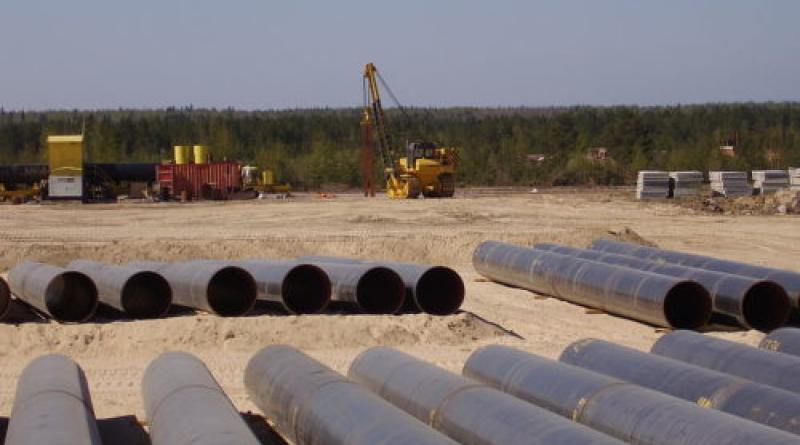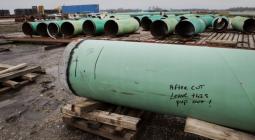Three projects, three wins: flurry of decisions shows U.S. pipelines becoming ‘unbuildable’.

The last 48 hours have seen a dizzying series of announcements highlighting the increasingly shaky prospects for North American oil and gas pipelines, with the US$8-billion Atlantic Coast Pipeline cancelled, the U.S. Supreme Court rejecting a bid to immediately restart construction of the Keystone XL pipeline, and a federal judge in Washington, D.C. ordering the Dakota Access Pipeline shut down for contravening U.S. environmental law.
The three rapid-fire wins had U.S. climate campaigners sensing “a turning point in their war against the Trump administration’s effort to cement a fossil-fueled future for the United States,” InsideClimate News reports. Greentech Media says the rulings reflect “a seismic shift facing the U.S. utility industry: the rise of renewables as a potentially less costly and risky alternative to fossil fuels.” The New York Times looks at what it calls the “next energy battle” now that the U.S. coal industry is in terminal decline: the push to limit natural gas use as wind and solar rise.
The news began accumulating Sunday, when big U.S. utilities Duke Energy and Dominion Energy announced they were pulling the plug on Atlantic Coast, a 600-mile gas pipeline from West Virginia’s Marcellus shale fields to southern North Carolina that looked particularly risky for minority communities. Dominion will also sell more than 7,700 miles of gas storage and transmission pipelines and about 900 billion cubic feet of storage capacity to Warren Buffett’s Berkshire Hathaway—which will pay $4 billion for the infrastructure and take over another $5.7 billion in debt the utility had accumulated.
“The announcement marks a major shift for Dominion away from competitive natural gas markets and toward state-regulated utilities focused increasingly on clean energy,” Greentech Media reports. “Those utilities include Dominion Virginia, its flagship, which faces a new state mandate to achieve 100% clean energy by 2045 and is asking state regulators to approve a long-range energy plan that vastly increases its stake in solar power, energy storage, and offshore wind.”
Two separate analyses by Bloomberg cited the weekend news as evidence that natural gas transmission and storage is a good place for investors to put their money, but that U.S. pipelines are becoming increasingly unbuildable.
“He’s willing to make investments now, of a fairly sizable amount,” said University of Maryland finance professor David Kass, referring to Buffett’s biggest acquisition in more than four years. “It’s very positive that he’s sending a signal for the right deal at the right price.”
But “gas pipelines that traverse state lines have typically required more extensive environmental reviews than oil pipelines, which in turn makes them more vulnerable to legal challenges and permitting problems,” the news agency wrote. “Investors have lost patience with big infrastructure projects, and the 2020 election poses too much risk for major projects to move forward,” said Sandhill Strategy LLC co-founder Katie Bays.
And indeed, “the utilities said the Atlantic Coast Pipeline was threatened by the uncertainty of legal decisions such as the U.S. District Court for the District of Montana’s ruling to overturn federal authority for projects crossing bodies of water. The Ninth Circuit indicated that an appeal of that decision would be unlikely to be successful,” Utility Dive reports.
While Dominion and Duke have both been showing more interest in the energy transition, Sunday’s announcement came with a large serving of sour grapes.
“For almost six years we have worked diligently and invested billions of dollars to complete the project and deliver the much-needed infrastructure to our customers and communities,” the two companies said in a statement. “This announcement reflects the increasing legal uncertainty that overhangs large-scale energy and industrial infrastructure development in the United States.”
Duke and Dominion cited a “series of legal challenges” that led to project delays and cost overruns, Utility Dive adds. “These lawsuits and decisions have sought to dramatically rewrite decades of permitting and legal precedent, including as implemented by presidential administrations of both political parties,” the companies wrote.
“Like too many shovel-ready projects before it, the Atlantic Coast Pipeline faced legal and permitting challenges waged without merit by activists, and these challenges ultimately cost Americans along its route the environmental, employment, and economic benefits that modern pipeline projects bring,” fumed the American Petroleum Institute, in a joint statement with North America’s Building Trades Unions.
But Appalachian Voices Executive Director Tom Cormons said the pipeline “was never needed, and the facts have never been more clear: fracked gas has no role in our energy future.”
“The costly and unneeded Atlantic Coast Pipeline would have threatened waterways and communities across its 600-mile path,” agreed Natural Resources Defense Council attorney Gillian Giannetti. “As they abandon this dirty pipe dream, Dominion and Duke should now pivot to investing more in energy efficiency, wind, and solar—that’s how to provide jobs and a better future for all.”
Astonishingly, the seismic announcement from Virginia wasn’t the only pipeline news to start the week. On Monday, in the case Utility Dive mentioned as a source of legal uncertainty for the Atlantic Coast project, “the United States Supreme Court declined a request from TC Energy and the Trump administration to allow Keystone XL to proceed under Nationwide Permit 12, a key water crossing permit for pipelines that a district court found unlawful,” Bold Alliance said in a release.
After District Court Judge Brian Morris in Montana ruled that the U.S. Army Corps of Engineers had violated the U.S.Endangered Species Act by issuing the permit, “the Army Corps had pushed to allow pipeline construction under the permit to continue during its appeal of the ruling in the Ninth Circuit. That court rejected the Army Corps’ request,” the Alliance recounted. “The Supreme Court’s order partially reverses the Ninth Circuit’s decision, allowing other pipelines to continue using Nationwide Permit 12, but continuing to bar the construction of Keystone XL through rivers, streams, and wetlands while the appeal is heard.”
Project proponent TC Energy, the Calgary-based pipeliner previously known as TransCanada, “faces additional roadblocks to completing Keystone XL, including other legal challenges, oil market chaos, and a recent commitment by Joe Biden to rescind the pipeline’s permit should he be elected president,” Bold Alliance adds. Alberta Premier Jason Kenney maintains Biden can be “swayed” to support Keystone, but the presumptive Democratic nominee for president apparently has other ideas.
“The Supreme Court sided with clean water and the people today,” said Bold Alliance founder Jane Kleeb. “The government has abused the Army Corps’ permitting process, putting our water at risk just because Big Oil demanded a fast approval process. We will continue to fight to protect our clean water for future generations.
“More than 10 years after it was proposed, Keystone XL is as far as it’s ever been from being completed. We’re glad to see the court acknowledge that the Trump administration is not above the law and cannot just ignore critical environmental protections in pursuit of building this dangerous tar sands pipeline,” added Sierra Club Senior Attorney Doug Hayes.
See the Bold Alliance’s release for more commentary on the decision.
And in Washington, District Judge James Boasberg “sided with the Standing Rock Sioux Tribe and ordered the Dakota Access pipeline to shut down until more environmental review is done,” MPR News reports, concluding in a 24-page order that the project remains “highly controversial” after three years in operation. The judge said he was “mindful of the disruption such a shutdown will cause,” but still gave Energy Transfer Partners 30 days to shut it down until a proper environmental review can be completed.
“The Court does not reach its decision with blithe disregard for the lives it will affect,” Boasberg wrote. “Yet, given the seriousness of the Corps’ NEPA (U.S. National Environmental Policy Act) error, the impossibility of a simple fix, the fact that Dakota Access did assume much of its economic risk knowingly, and the potential harm each day the pipeline operates, the Court is forced to conclude that the flow of oil must cease.”
“The $3.8 billion, 1,172-mile (1,886 kilometre) pipeline crosses beneath the Missouri River, just north of the [Standing Rock] reservation,” which draws its water from the river, The Associated Press notes. “The tribe pressed litigation against the pipeline even after it began carrying oil from North Dakota across South Dakota and Iowa and to a shipping point in Illinois in June 2017.”
“Today is a historic day for the Standing Rock Sioux Tribe and the many people who have supported us in the fight against the pipeline,” said Standing Rock Sioux Tribe Chair Mike Faith. “This pipeline should have never been built here. We told them that from the beginning.”
7 July 2020
The Energy Mix




